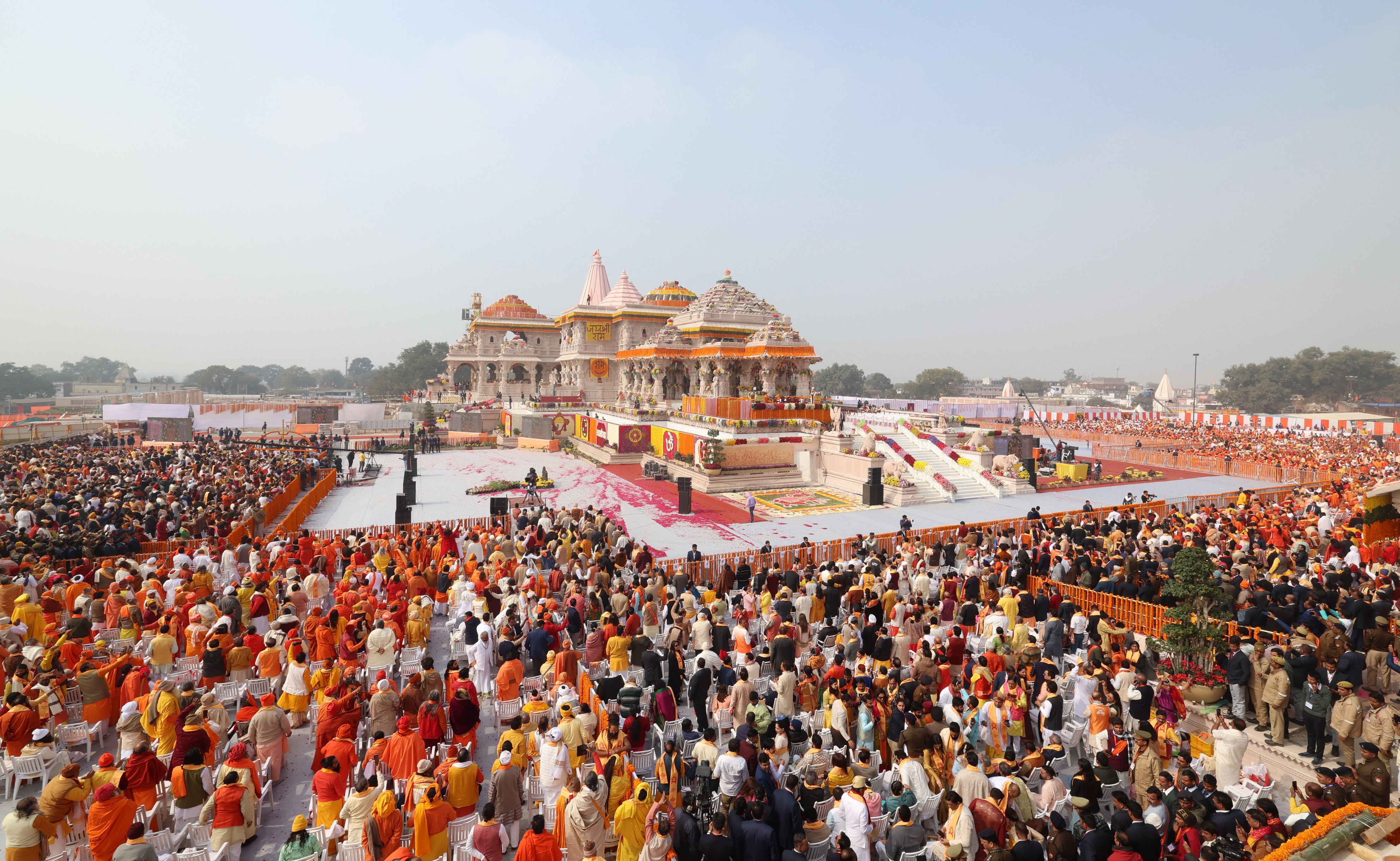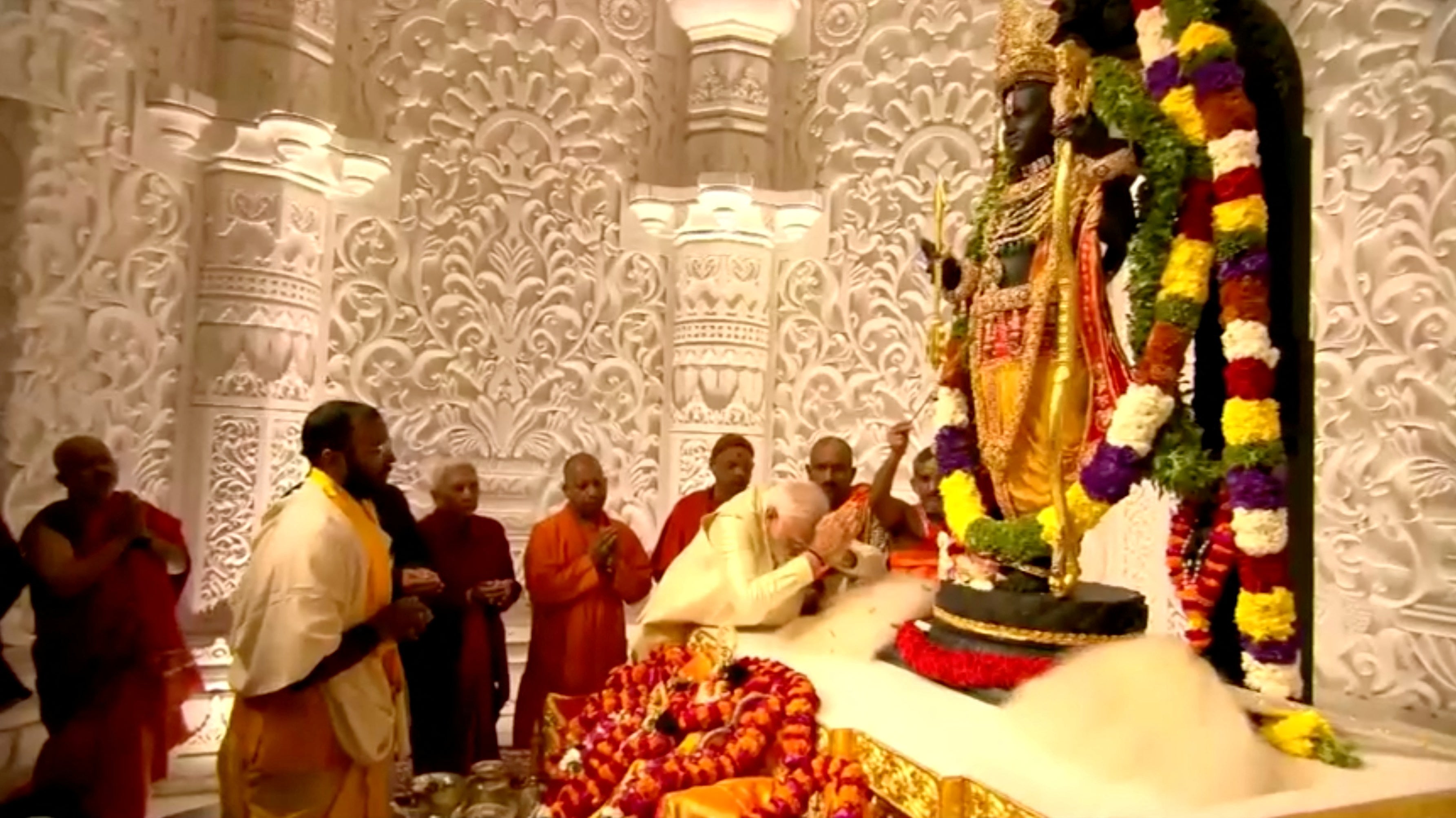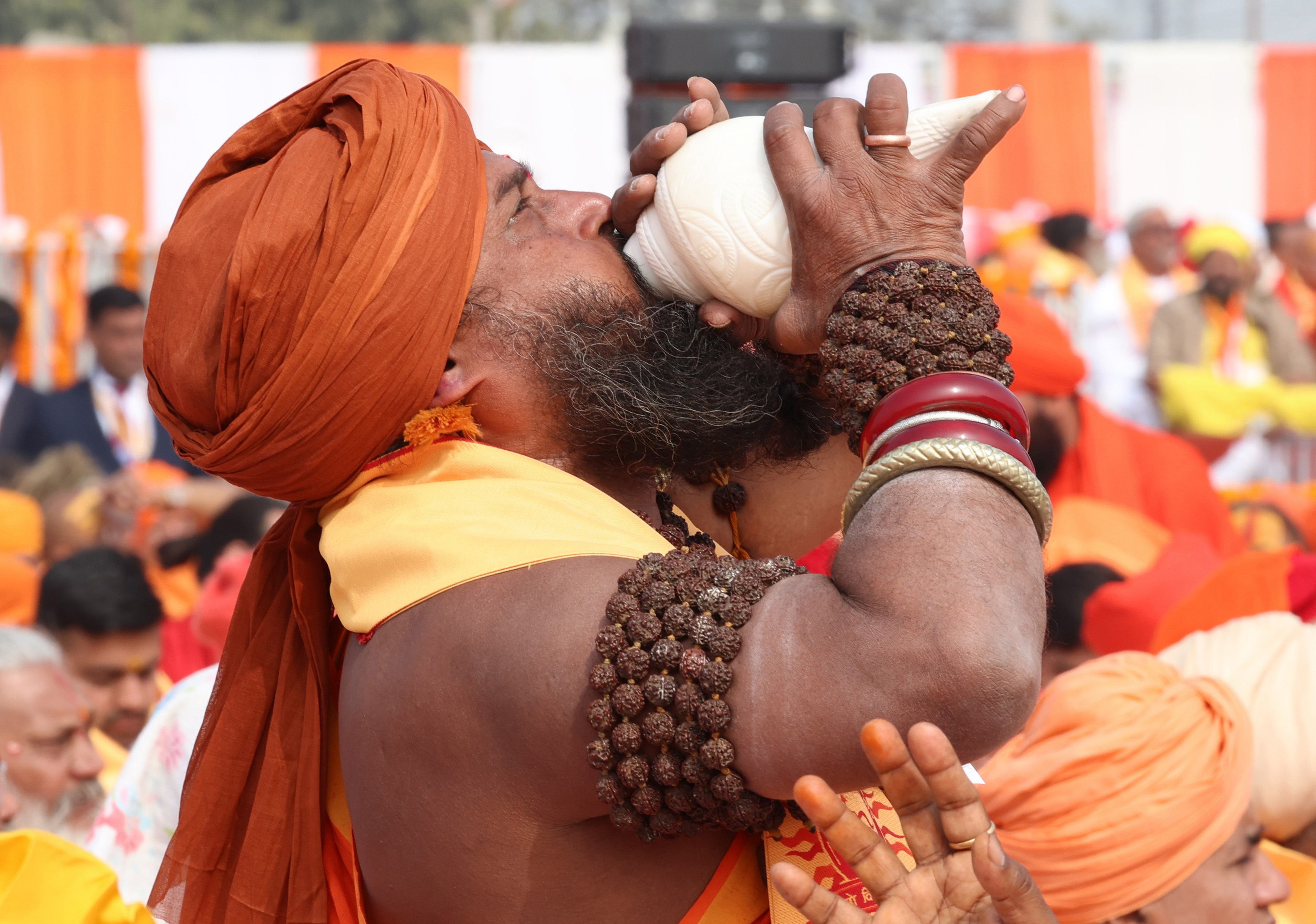Modi hails controversial Ram temple inauguration as breaking ‘shackles of slave mentality’
‘Our Lord Ram has arrived after centuries of wait,’ says Modi at inauguration of Ram temple, a project central to his party’s vision of reclaiming Hindu pride
Your support helps us to tell the story
From reproductive rights to climate change to Big Tech, The Independent is on the ground when the story is developing. Whether it's investigating the financials of Elon Musk's pro-Trump PAC or producing our latest documentary, 'The A Word', which shines a light on the American women fighting for reproductive rights, we know how important it is to parse out the facts from the messaging.
At such a critical moment in US history, we need reporters on the ground. Your donation allows us to keep sending journalists to speak to both sides of the story.
The Independent is trusted by Americans across the entire political spectrum. And unlike many other quality news outlets, we choose not to lock Americans out of our reporting and analysis with paywalls. We believe quality journalism should be available to everyone, paid for by those who can afford it.
Your support makes all the difference.Narendra Modi on Monday inaugurated a controversial Hindu temple built on the ruins of a 16th-century mosque in Ayodhya, fulfilling a decades-long pledge that his governing right-wing party hopes will catapult him to a historic third successive term in upcoming national elections.
Dressed in a traditional kurta tunic, the Indian prime minister led the opening ceremony as Hindu priests chanted hymns inside the temple’s inner sanctum in the northern Indian city, believed to be the birthplace of Hindu god Ram.
“Our Lord Ram has arrived after centuries of wait,” Mr Modi said in a speech after the ceremony, receiving resounding applause from thousands of attendees, including elite industrialists, politicians, and movie stars.
Mr Modi’s Bharatiya Janata Party (BJP) and other right-wing groups portrayed the project as central to their vision of reclaiming Hindu pride. They see the temple as a sign of Hindu reawakening from centuries of foreign subjugation, including rule by Muslim dynasties such as the Mughals, and British colonialism.
The temple was built after “countless sacrifices” and is a testament to a rising India “breaking the shackles of slave mentality”, Mr Modi said, as the temple replaces Babri Masjid, a Mughal-era mosque razed by radical Hindu groups in 1992.
“22 January 2024 is not merely a date but marks the dawn of a new era,” he said as millions of Indians watched the ceremony on television, with news channels running wall-to-wall coverage of the event.

The mosque was demolished by religious workers or kar-sevaks on 6 December 1992, leading to nationwide riots that left around 2,000 people dead, most of them Muslims.
The decades-long dispute ended in 2019 when, in a controversial decision, the Supreme Court of India granted the site to Hindus and gave a different plot of land to Muslims for a mosque, even as it called the mosque’s destruction “an egregious violation” of the law.
Thanking the judiciary for their unanimous verdict paving the way for temple, Mr Modi said: “The legal battle over the existence of Lord Ram went on for decades. I would like to express my gratitude to the judiciary of India for doing justice.”
The event has ignited religious fervour across India, with many states declaring a holiday on Monday, stock markets remaining shut, and homes and businesses being illuminated with lights. Thousands of people clad in saffron clothes danced in the streets, waved saffron flags and chanted religious slogans, after Mr Modi called for the day to be marked as another Diwali, the Hindu festival of light.
Key leaders from opposition parties stayed away from the event, although in their own ways the main opposition Congress party and the Aam Aadmi Party (AAP), which runs the Delhi local assembly, held events designed to mark the day and appeal to Hindu voters who constitute 80 per cent of India’s population.

While AAP planned a series of events to mark the consecration ceremony in Ayodhya, including religious processions, community kitchens and recitals of religious texts in part of Delhi, Congress leader Rahul Gandhi staged a protest after being denied entry in a temple in the northeastern state of Assam.
“The entire country is enthusiastically lining up to welcome Lord Shri Ram and Delhi is not lagging behind. On 22 January, all AAP ministers, MLAs, councillors, leaders, and workers will participate in bhandaras (community kitchens), prasad (religious food offering) distribution, and shobha yatra (religious processions) programmes,” said Dilip Pandey, a local legislator from Delhi for AAP, according to TheIndian Express.
Mr Gandhi alleged he was stopped from visiting Batadrava Than temple, the birthplace of saint Srimanta Sankardeva. The incident took place a day after Assam chief minister Himanta Biswa Sarma advised him to visit the place after the consecration ceremony of the Ram temple in Ayodhya to avoid “unnecessary competition”.
Raising questions about the restriction imposed, Mr Gandhi said “We want to visit the temple. What crime have I committed that I cannot visit the temple?”

“We don’t want to create any problems, we simply want to pray at the temple.”
Analysts and critics see Monday’s event as the start of the election campaign for Mr Modi, while they raise concerns about the rise of communal politics in India.
They say the pomp-filled display led by the government shows the transformation of the country from a secular democracy into a distinctly Hindu state under Mr Modi.
“Prime ministers prior to Modi have also been to temples, been to other places of worship, but they went there as devotees. This is the first time that he went there as somebody who performed the ritual,” said Nilanjan Mukhopadhyay, an expert in Hindu nationalism and author of a book on both Mr Modi and Ayodhya, including the title The Demolition and the Verdict.
“We have somebody who is acting like the king and has announced that divinity is passing through him or he is chosen by God, by the divine voice to perform this ceremony,” political scientist Rajeev Bhargava told The Wire.
“This is a total subsumption of religion by politics. The line between the religion and the state has been broken down and is breaking down entirely at the initiative of the state which is dictating how religion and religious ceremonies are to be conducted,” he said.
Join our commenting forum
Join thought-provoking conversations, follow other Independent readers and see their replies
Comments